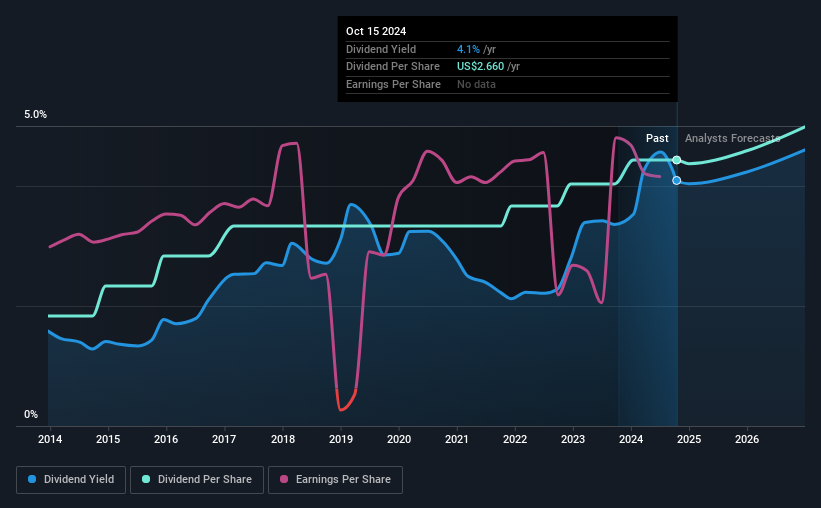Four Days Left To Buy CVS Health Corporation (NYSE:CVS) Before The Ex-Dividend Date
Readers hoping to buy CVS Health Corporation (NYSE:CVS) for its dividend will need to make their move shortly, as the stock is about to trade ex-dividend. The ex-dividend date is usually set to be one business day before the record date which is the cut-off date on which you must be present on the company's books as a shareholder in order to receive the dividend. The ex-dividend date is important because any transaction on a stock needs to have been settled before the record date in order to be eligible for a dividend. Accordingly, CVS Health investors that purchase the stock on or after the 21st of October will not receive the dividend, which will be paid on the 1st of November.
The company's next dividend payment will be US$0.665 per share, and in the last 12 months, the company paid a total of US$2.66 per share. Based on the last year's worth of payments, CVS Health stock has a trailing yield of around 4.1% on the current share price of US$65.00. If you buy this business for its dividend, you should have an idea of whether CVS Health's dividend is reliable and sustainable. That's why we should always check whether the dividend payments appear sustainable, and if the company is growing.
View our latest analysis for CVS Health
If a company pays out more in dividends than it earned, then the dividend might become unsustainable - hardly an ideal situation. That's why it's good to see CVS Health paying out a modest 45% of its earnings. Yet cash flows are even more important than profits for assessing a dividend, so we need to see if the company generated enough cash to pay its distribution. Over the last year it paid out 62% of its free cash flow as dividends, within the usual range for most companies.
It's encouraging to see that the dividend is covered by both profit and cash flow. This generally suggests the dividend is sustainable, as long as earnings don't drop precipitously.
Click here to see the company's payout ratio, plus analyst estimates of its future dividends.

Have Earnings And Dividends Been Growing?
Stocks with flat earnings can still be attractive dividend payers, but it is important to be more conservative with your approach and demand a greater margin for safety when it comes to dividend sustainability. If earnings decline and the company is forced to cut its dividend, investors could watch the value of their investment go up in smoke. With that in mind, we're not enthused to see that CVS Health's earnings per share have remained effectively flat over the past five years. It's better than seeing them drop, certainly, but over the long term, all of the best dividend stocks are able to meaningfully grow their earnings per share. Earnings growth has been slim and the company is paying out more than half of its earnings. While there is some room to both increase the payout ratio and reinvest in the business, generally the higher a payout ratio goes, the lower a company's prospects for future growth.
Many investors will assess a company's dividend performance by evaluating how much the dividend payments have changed over time. In the past 10 years, CVS Health has increased its dividend at approximately 9.2% a year on average.
To Sum It Up
From a dividend perspective, should investors buy or avoid CVS Health? CVS Health has struggled to grow earnings per share, and it's paying out less than half of its earnings and more than half its cash flow to shareholders as dividends. In summary, while it has some positive characteristics, we're not inclined to race out and buy CVS Health today.
With that in mind, a critical part of thorough stock research is being aware of any risks that stock currently faces. In terms of investment risks, we've identified 1 warning sign with CVS Health and understanding them should be part of your investment process.
If you're in the market for strong dividend payers, we recommend checking our selection of top dividend stocks.
Have feedback on this article? Concerned about the content? Get in touch with us directly. Alternatively, email editorial-team (at) simplywallst.com.
This article by Simply Wall St is general in nature. We provide commentary based on historical data and analyst forecasts only using an unbiased methodology and our articles are not intended to be financial advice. It does not constitute a recommendation to buy or sell any stock, and does not take account of your objectives, or your financial situation. We aim to bring you long-term focused analysis driven by fundamental data. Note that our analysis may not factor in the latest price-sensitive company announcements or qualitative material. Simply Wall St has no position in any stocks mentioned.
 Index Options
Index Options CME Group
CME Group Nasdaq
Nasdaq Cboe
Cboe TradingView
TradingView Wall Street Journal
Wall Street Journal